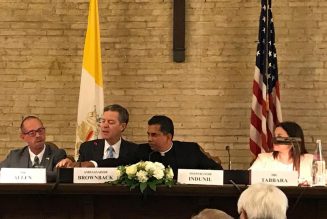
I know the title of this blog will get some people up in arms, but before you get the pitchforks out, bear with me a bit and I will try to make my argument. Before I get to the nitty-gritty, let’s examine a few facts:
- Fact #1 – Jesus had active discipleship relationships with 12 men at a time (maximum), during his ministry. He spent a majority of his time with these men and taught them to do the same with others.
- Fact #2 – Of the Apostles we know of post-Pentecost, all of them went on to have disciples themselves. Peter had Mark. John had Ignatius of Antioch and Polycarp. Notice, they only had small numbers of others they discipled (that we know of).
- Fact #3 – Most of the Church’s history had small congregations, yet today our congregations average over 1,000 registered (not including those that never register or those that never go to church), in the U.S..
- Fact #4 – When in a spiritual crisis / need, the first person many Catholics reach out to is a priest.
- Fact #5 – The maximum number of people that the average person is able to have meaningful and stable relationships with is 150 (Dunbar’s number). These relationships take time to build. Thus, a pastor of a Catholic parish usually takes many years to get to that number. If a pastor moves to a parish of 1,500 registered people, after several years, (at best) he will be able to have some kind of ongoing relationship with 10% of his flock. Thus, the VAST majority of parishioners will not have their spiritual needs met by an ongoing pastoral relationship with priests. It is simply a mathematical impossibility. This reality is the fulfillment of what Jesus saw on the shore of the lake – “they were harassed and helpless, like sheep without a shepherd” -Matt 9:36
- Fact #6 – In my own conversations with priests through the years, the number they can truly have good and ongoing relationships with is much much lower than 150 people. It is closer to a few dozen. This is due primarily to time constraints. They simply don’t have the ability to invest in many people after all the administration, Sacramental duties, finances, meetings, etc. The more realistic number for a pastor to be able to handle is easily in the single digit percentage-wise of their flocks. Think 1% to 8%, depending on the size of their congregation. These numbers will continue to go down as we have fewer priests in the coming years.
- Fact #7 – Lay people can care for many spiritual needs of other lay people.
BEWARE THE TRAP!
After reading this, many will stop and think we need to make changes! Yes, we do. But, the changes we need may not be what many are thinking they are. Minor changes in programming, emphasis, new committees, initiatives, etc aren’t going to make a dent. Our parishes need substantial changes in strategy and ultimately culture. To put it in the negative first:
- Adding new programs won’t make declining parishes grow.
- Adding more staff won’t make declining parishes grow.
- Merging parishes won’t make 2 or 3 declining parishes grow.
- Changing our music, liturgy, or website won’t make declining parishes grow.
- Making a push for more lay people to “get involved” won’t make declining parishes grow.
All these things – programs, mergers, staffing, music, website, (and even) liturgy, etc. are meant to be at the service to the greater mission of the parish, which is to make disciples. Yet, the reality is we are poor at this one thing we are supposed to be about. We are not making disciples at any reasonable rate. We have culturally lost our sense of what makes us who we are – disciples of Jesus who are supposed to go make more disciples of Jesus. Without this being the very heart of our parish culture…we will not change things.
A mature disciple of Jesus (clergy or lay) can evangelize others, help carry their burdens, help grow another’s prayer life, be there in times of crisis, etc. But raising up disciples of Jesus who are ready to help with such endeavors isn’t going to happen through another training program or class. It is from a massive cultural shift.
Leaders sometimes fall for the trap in believing that they can ignore the underlying issues. But, the truth is without substantial changes to your basic culture or strategy, we have become a church which is merely managing the decline, not actually making disciples. Our parishes are self-serve cafeterias in a culture that values sit-down full-serve fine dining.
SELF-SERVE
In college, I fell in love…with a cafeteria. At the height of my metabolism I had an all-you-can-eat and as-much-as-you-can-eat option in the college cafeteria for four years, three times daily. I ate most meals like they were my last. I especially liked the pizza, hamburgers, and cereal bar. I mostly avoided the vegetables. Most of my peers avoided the cafeteria all together, because most of what they offered wasn’t very good or healthy.
This is what our parishes look like. We offer a wide variety of things, without thinking about the purpose of what we are doing, if it helps create healthy Catholics, or who it may appeal to. In the 21st Century Catholic Church in the USA we moan about the consumerist mentality. I have multiple times. Yet the reality is that unless we pivot to give people what they are looking for, they won’t engage with our parishes.
Most folks today want fine dining with a few close friends, not a loud cafeteria full of food (much of it with little nutritional value). People want to spend their time in community, friendship, meaningful conversations, and opportunities to be heard, and then (later on) learn more about how to grow as a disciple.
This won’t happen in larger groups. We have established that our priests are unable to do this with the vast majority of Catholics (much less with those that don’t go to our parishes). So, the answer is in lay-led small groups and one-on-one relationships.
To be an effective parish, which cares for all who are part of the life of the parish and also has the ability to reach others with the Gospel of Jesus, we need a shift from priest-centric pastoral care to lay-centric pastoral care. We see this in the early church as well. The most important duties of the Apostles (priests and bishops) became harder to accomplish as the church grew post-Pentecost. Thus, in Acts 6 we see the establishment of the diaconate to share some of the administrative responsibilities and free the Apostles to preach the Gospel and shepherd the flock. Then the burden was shared by the laity as well. The women who helped fulfill the needs of the community. The poor. The rich. The elderly. The young. Everyone had a role in bringing the Gospel to others, but a role that was dependent on their gifts. Paul tells us:
“Now there are varieties of gifts, but the same Spirit; and there are varieties of service, but the same Lord; and there are varieties of working, but it is the same God who inspires them all in every one. To each is given the manifestation of the Spirit for the common good” (1 Cor 12.4-7)
Of course, this included laity.
LAY-CENTRIC PASTORAL CARE
Some Catholics get worried when the role of the laity goes beyond pray, pay, and obey. It need not worry us though. We also need not blur the lines between the clergy and laity. Only our priests can give us the Sacraments. Only our priests can pastor our parishes. Only our clergy can preach homilies during Mass. Etc. To have a lay-centric pastoral care model we need to define what that might look like. Here are a few markers for such a parish:
- Aim at conversion through evangelization outside of the parish. So much of the modern concept of “discipleship” and “ministry” is about passively receiving information. But, our goal should be transformation that comes from conversion of heart and action, not just the reception of information. Of course, we can’t love what we don’t know. But, the purpose of knowledge is to help us love more, not just be information that is good to know. So, our goal in every part of what we do in pastoral ministry should be making transformed lives. We need to aim at being converted more and more closely into the saints God calls us to be. This can’t happen until we open our own hearts, through prayer, and allow the Holy Spirit to operate through us. It also can’t happen unless we bring the Gospel to those who will never come to our parishes. Only with a laity made up of missionary disciples can we accomplish this.
- Purposeful and intimate friendships. Purposeful in the sense that the relationships have a plan and mission – to make and grow missionary disciples, who do the same with others. This is both caught and taught. Intimate in the sense of putting in the time and effort to build trust and to do so within conversations that matter. Without intimacy, spiritual friendships cannot grow. This is what our accompaniment of other parishioners ought to look like. We walk together to deeper relationships with each other and Jesus. It is inefficient and our clergy simply can’t invest in everyone. We need laity to take on this role as well.
- A vision for growth. Every Catholic should know what the purpose of their friendship with another is. They should also be able to communicate what happens in the next “generation” of disciples. In other words, each friendship, while an end unto itself, is not the end of our mission. Those we are in relationships with (esp. Those we mentor) should be able to equip others to multiply disciples themselves.
I know of many small groups that have been going on for years. The members grow in knowledge of Scripture, Church teachings, etc – but their personal prayer, action, and mission are not changed over the course of those years. This is primarily due to the fact that the group is fulfilling what it was started for – education on different subjects. It isn’t started to be a process that transforms members’ lives and then equips them to be transformative agents in the lives of others. To change lives, we have to have our own lives changed first.
OUTCOMES:
Some of the outcomes of having intentional lay-centric pastoral care are:
- It takes much of the burden off of our priests. I know that during a spiritual crisis the men that I walk with are more likely to make their first call to me (or another lay friend they are walking with) than to a priest. This can’t be said for someone who has no other meaningful spiritual relationships.
- It makes pastoral care scalable. We can’t just reproduce a ton of new priests to care for all the Catholics in our world. We can care for one another. Thus, this model is scalable, while a priest-centric one is not.
- It fills in the gaps where Catholics are weak. Our parishes aren’t helping people find meaningful community or relationships. Furthermore, it gives a place where active conversations can happen, rather than just passive reception of information. For these two reasons alone, the model can benefit many who are on the cusp of disaffiliation.
- Slows the decline and turns it into growth. Without large-scale changes in HOW we operate, we won’t make a dent into the decline, at least while you and I still live. But, with this kind of model in place, we can not only slow the decline, but turn it around. We can grow. Only disciples of Jesus can make other disciples of Jesus. This is our mission. This is our calling.
**Click here to read more on discipleship relationships
Join Our Telegram Group : Salvation & Prosperity








